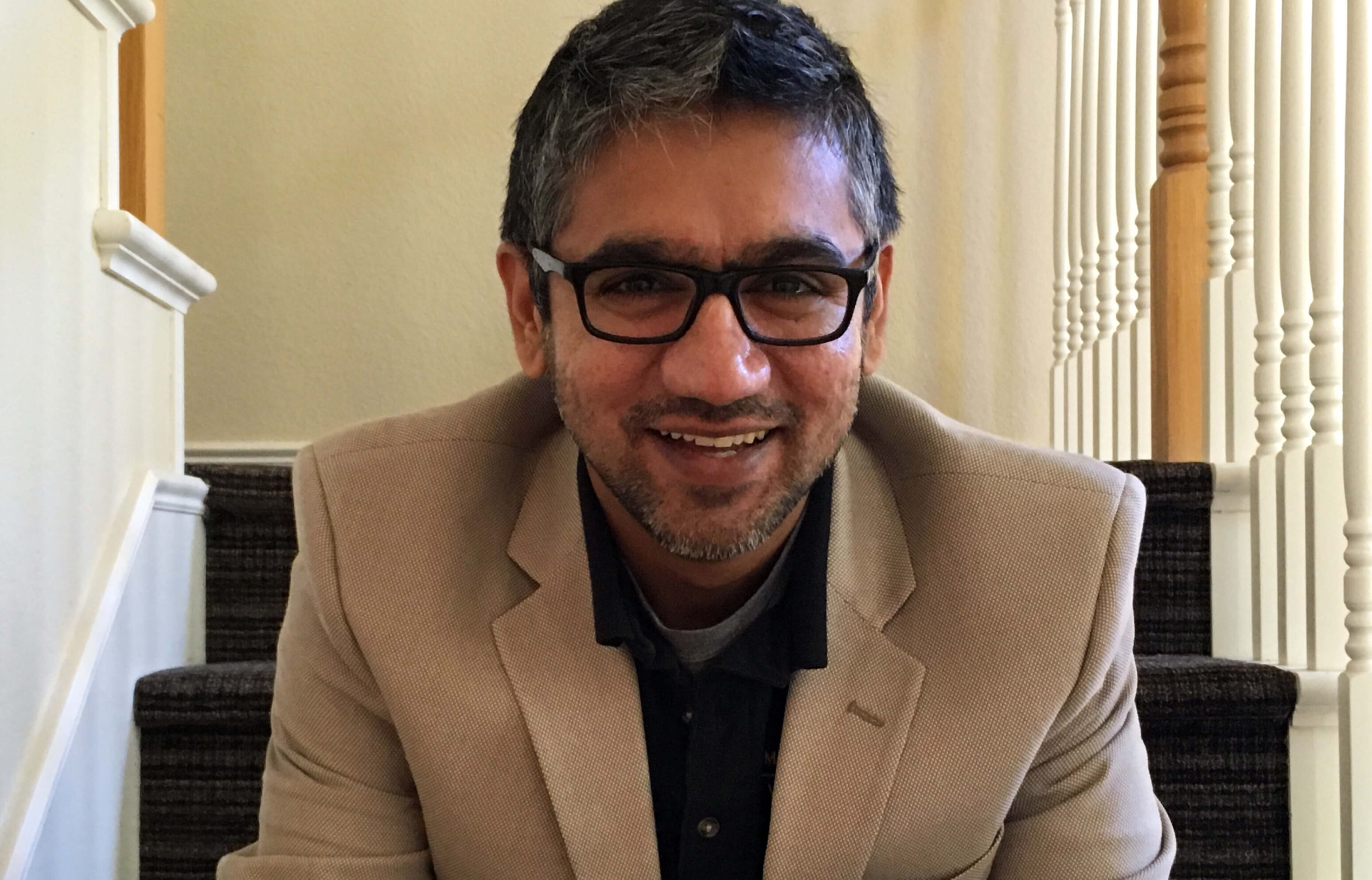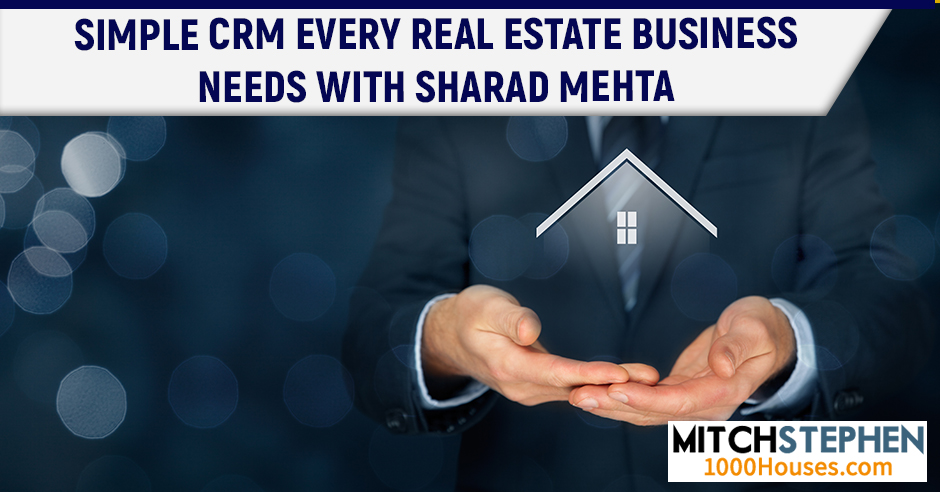PODCAST
Simple CRM Every Real Estate Business Needs With Sharad Mehta


Mitch Stephen chats with
Sharad Mehta
Episode 430: Simple CRM Every Real Estate Business Needs With Sharad Mehta

In this day and age, you cannot expect to be competitive in real estate without using some sort of software to optimize your processes. Seeing a real need in this regard, Sharad Mehta created RESimpli, a simple CRM software that gives real estate investors the benefits of real-time data and automation without going through a steep technical learning curve. After all, CRMs are built to make your life as an investor easier; to create one that is incredibly easy to use makes perfect sense. Join in as Mitch Stephen talks to Sharad about this incredible software as well as some discussion on buy and holds and other topics. Sharad also imparts some of the lessons he learned after many years in real estate investing.
—
Watch the episode here
I’m here with Sharad Mehta and we’re going to be talking about buy and hold but more importantly, the systems, some creative softwares to help your life become much easier after you built or while you’re building a portfolio. Keeping track of things becomes the business. Once you’ve originated a lot of doors or built a portfolio, the work is in maintaining. We’re going to talk about that. How are you doing, Sharad?
I’m doing good, Mitch. How are you doing?
I’m doing great. I need to pay homage to my sponsor, TaxFreeFuture.com. If you do not have a tax-deferred or tax-free account in which to grow your retirement plans or your finances in, then you are missing a gigantic tool out of your tool belt. Please check out TaxFreeFuture.com for self-directed IRAs, 401(k)s, health and educational accounts. You won’t believe what your financial advisors are not telling you. We’re going to tell you what they’re not telling you. We’re going to tell you why they’re not telling you. You can then do what you want with that information but it’s a big deal. I’m going to show you personally.
There are 37 little video vignettes there. If you’ll give your micro information, you’ll get the 37 little video vignettes. My favorite ones are how people like me and other investors take very small amounts of money in our self-directed retirement plans and make them into very large amounts of money very quickly. It’s one of the stopping points for a lot of people. We’ll show you how to get through it. My friend, I paid the bills. Sharad, you look like a young man. How long have you been in the real estate business?
I’ve been doing this full-time for many years now.
You’re physically in Toronto but you do business in Indiana.
I moved to Toronto in 2020. I went to school in New York and I moved to Chicago for my job. I started investing when I was working for a time in Chicago. I started investing in Indiana, right outside of Chicago. I moved to Southern California and now I live in Toronto.
How did you get started in the real estate business? What were you doing before and how did you end up in the real estate business?
I was an accountant for a time and I always wanted to invest in some passive income. By nature, I’m a very lazy person. I read a book called Flip and then from there, I read The Millionaire Real Estate Investor. I’m like, “This sounds like a great book. This is exactly what I want to do.” I adopted that model and I started buying rental properties from there.
Is it like a DIY?
Exactly.
Have you studied any specific mentors or gurus out there?
Not really. I read a lot of books and online forums. That’s what I follow. My philosophy has been very simple. It’s having a portfolio of rental properties. I have about 75 units and most of them are paid for free and clear. That’s how I got started. I started investing in 2010, right around when the bubble burst. That was a big influence on my investing. I wanted to invest and not get caught up in the boarding game. I started buying them free and clear, and then took the money and kept reinvesting.
If you’re doing real estate, make sure your spouse is on board. It's hard to execute anything when you don't feel 100% supported at home. Share on XIt’s a slow start, but it starts to snowball fast. When it starts to snowball, it goes. It’s hard to get it up to the snowball. Once it starts happening, you can’t hardly stop the money from coming in, can you?
That’s where the fun happens. It’s definitely a grind in the beginning but once that snowball effect comes in, that’s when you start seeing.
You decided to go free and clear because you were scared of getting debt and then getting crushed.
To some extent and on a personal finance side, I’m a huge fan of Dave Ramsey. He was a big influence on that. Around that time, I was reading a lot about personal finance. I got a job an I’m looking at ways to invest. I started investing in stocks and bonds. I wanted to invest in something that was more tangible, something I felt like I had 100% control of versus investing in stocks where I was a very small part of the company versus owning an entire property. That’s where the influence came from, just a little common sense. I do have a pretty smart wife, so that doesn’t suck.
Dave Ramsey would hate me, Sharad. I bought my first 100 houses on credit cards. Years ago, in Indiana, it has these kinds of houses. Now they still have very affordable houses. San Antonio, Texas was some of the most affordable housing in the world as far as decent housing. I can buy houses all day long. I’m getting the classifieds at 8:00 in the morning and by noon, I have 1 or 2 houses penciled up. Perfectly good deals. They were $15,000 to $20,000 in the lesser side of town. I’d go get like $10,000 off of this credit card and $10,000 off that credit card and I buy it. I get cash advances and then I get $10,000 off another credit card to fix it. I’d flip it for $60,000. Dave Ramsey would have completely flipped out probably.
Dave Ramsey is reaching to a different audience. Somebody like me at that age may have squandered that money in something else. That’s where maybe I needed that discipline to stay focused. You’re way more disciplined and smarter than I am. You did it the right way but I didn’t trust myself with the credit.
Don’t get me wrong. Everyone has a place because there’s a whole bunch of different people out there. That’s the goal of this show. I don’t know everything. Everything that I have is not for everybody and everything you have is not for everybody. I’m trying to help people find where they belong and help them find their financial independence so that they can get out there and be who they’re supposed to be. You want to pick Mitch, you want to pick Sharad, you want to pick Dave Ramsey or whoever you want to pick, I don’t care. Let’s help you find where you belong.
Everybody’s going to relate to something differently. You’re absolutely right on that.
Where and what types of investing are you targeting? Are you fourplexes? Are you trying to get into 100 doors or more now? Where are you at?
I started out buying 2 to 4-unit. I was paying everything with cash, so I couldn’t go out and buy a 100-unit building. I was paying 2 to 4-unit. It’s something to keep in mind. The part of Indiana that I invest in is very affordable.
Let’s say you’re buying a duplex, how much are you paying for it? How much is your positive cashflow in the beginning?
The first property I bought was listed on the market for $65,000. I offered $20,000 because I figured what’s the worst that’s going to happen. We went back and forth. They accepted for $25,000. I put $10,000 into it. I was all in for about $35,000 and the two units I rented for $1,300 a month. That was my first property that I bought and I still own it to this day.

Real Estate CRM: Investors usually work with multiple systems to run their business and very often, those systems do not speak with each other. The goal is to have one software that replaces them all.
Where did you get the money for that?
My wife and I have always been very conservative with our finances. We’ve always lived on the lower income and save the higher income. We had some cash saved up. I did take some loan, but I took very aggressive loan in the sense where I can force myself to pay them off. I would take from a private lender a seven-year amortization with a two-year balloon. I had to make sure that I was saving money to pay off those loans as they were coming to you.
You put yourself on a fast track. You’re backed in a corner. You didn’t overextend yourself, so you got one paid and now it’s easier to do the next one and it’s easier to do the next one after that, as long as you don’t make any huge mistakes. Can I ask you a personal question? You don’t have to answer if you don’t want to. Was your wife on board with all this or was there a little disparity at first?
She was more or less on board. I convinced her over a good Panda Express meal. My parents were a little bit more hesitant than my wife was. My thought process was we’re still young. What’s the worst that’s going to happen if this thing doesn’t work out? The downside is I go back and get an accounting job, which won’t be too hard. The upside is if everything works out, it’s amazing. That was rolling the dice. I said, “Let’s give myself 1 or 2 years.”
Did I hear you say that your parents were the bigger obstacle than your wife?
They were. Coming from the background that I come from. I’m originally from India and families are part of the decision. Not that they didn’t want me to do it, but they weren’t super uncomfortable with the idea of leaving a stable job.
My wife wasn’t on board at all. When my wife discovered that I had $250,000 worth of credit card debt after we’d been married for 30 days, she was going to get a divorce. There’s no doubt about it. I knew her answer was no, but I also knew I had $500,000 worth of free and clear. I wasn’t worried at all, but it freaks out a person. It all worked out fine. We’ve been married now for many years, but there was no way for me to get her up to speed in the amount of time that I needed to buy these things because deals don’t wait around for people. I needed to strike. I went out on a limb.
That’s one reality that people have to deal with. You might have these amazing goals, but if your wife is not on board, then it’s hard to execute everything when you don’t feel 100% supported at home. I didn’t have that issue.
For the readers out there, I deal with this a lot. About 30% of my students, the spouse is not on board. We have to take a whole different approach. We have to flip some stuff really quick. We have to get some money in the bank. We have to prove a little bit. I call it hush money, Sharad. It’s like, “I’ve got my whole year salary in the bank now. Can we push up for a second and let me?” You started developing some software to help manage your portfolios. Tell us a little bit about your software.
I moved to Southern California in 2015. I’d been working full-time starting in 2011. Four years into it, my wife got a job in California. We moved there and then once, we moved there, I’m like, “This is great.” As I started looking into the systems that I could use to run my business, I realized I would have to get all these different things. Even after I got all this software, they didn’t speak with each other. At that point, I decided that it would be good idea to create something that I could use for my business. It’s gotten to the point where we have hundreds of other investors using it across the country.
That was the goal behind it. I’m in a very fortunate situation that I own a property management business so I get to see the property management side of it. I have a very active fix and flip business and I own a portfolio of rental properties. I’m in a position where the software that we created is very broad in terms of its reach. Our goal is to have one software that replaces multiples of software that investors are using.
I want everyone to go to 1000Houses.com/Sharad if you want to learn more about the software. What is the saying? Necessity is the mother of invention. It’s the reason why I invented LiveComm, which was to be able to capture the incoming caller’s phone number and have it put automatically into a text distribution list so I could inform thousands of people every time I had a new house for sale owner financed. No one was doing it the way I wanted to do it, and no one was doing it where I could afford it. There were people doing some similar stuff so I had that luxury. Are you from a tech background?
I’m not. I come from a business background. I went to school for accounting. I used to be a CPA. My wife’s a CPA. In this day and age, it’s a very connected world. As long as you have an idea, it’s not the toughest spot to find people who can help you execute the idea.
It’s always better to learn from other people rather than making your own mistakes. Share on XI was curious because I had to sub out my whole thing. All I knew was what I wanted to do and get it done because you can do anything. If you could dream it, you could probably do it. It’s a matter of how much money and how much time.
I had the idea and I knew what I wanted the end result to look like. We’re still not 100% there. Every day, we’re adding more pieces to it. Our goal is to have investors go to our website and be able to run their entire business.
I understand the process too because there’s going to be so many options that you can get overwhelmed with the big picture. All I need to do is put them in an order and do it one at a time. Also, maybe as a helpful hint but I’ve started taking suggestions from how QuickBooks did. They wanted suggestions from their people and people made suggestions about how they can make their software better or improve. They started taking suggestions from the people. That’s what we did at LiveComm, we started listening. When we would start seeing the same suggestion over and over again, we moved that to the top. It’s been a long process. It’s a tough thing to build. Have you been doing this for a pretty long time with this software? Do you have a lot of subscribers? Do you have a fledgling amount right now? Where are you at?
We started building the software in 2016. I started on what I needed in my business. A lot of stuff that we’re developing is coming based on the feedback. We have a very active Facebook group for our paid customers. We have over 300 companies that are using our platform right now.
Where do you advertise? A lot of people have great ideas, but a great idea by itself sits on your countertop. It doesn’t do anything. How did you figure out to find your users?
When I started, I thought if I build a great product people will come on their own. They’ll see a need for it, but that’s not the reality of it. I’ve been very fortunate. I’m part of a couple of masterminds who are connecting with the right people. It’s grown through building relationships with other people and then also through word of mouth. We’re not doing any paid advertisement at this point. We are going to start doing it but at this point, we’ve gone through building relationships with other influencers and then through word of mouth.
It’s smart when you’re young because you don’t want to get so much business and then you find a glitch in your software. I did the same thing with LiveComm. I want to grow grassroots and try to handle a little more because the last thing I want to do is get 10,000 subscribers and crash my whole deal.
At this point, we’ve hired more developers. We have a team of about 20, 25 developers working. We’ve grown our development team.
I’m going to guess that your developers are from India.
I wondered how you guessed that. I know in this day and age, it’s amazing what you could do with technology-wise, especially with the whole COVID thing going on. Everything has become virtual. There’s no difference in working with somebody the same town over somebody working overseas.
When did you start in the real estate game? When did you buy your first rental?
I was 26.

Real Estate CRM: One thing that you get working with a coach or a mentor is accountability. Sometimes we just need that push.
Since then, you go from zero to extra cashflow to what kind of monthly cashflow?
$25,000 to $30,000.
For the people out there reading, it’s a commitment. It didn’t happen overnight, but a man had a dream. I had the same dream as him. At one time I thought $3,500 a month so I could quit my job was almost impossible. If you can get $3,500 a month coming in, you can get $10,000 a month coming in. I’ve been doing this for many years. The sky is the limit of how much you want to do. I could go further and I could get a lot bigger than I am. You could too. My thing now is I want to enjoy what I’ve built. I could spend another ten years growing it to double what it is, but I can’t eat or drink or spend all that I have coming in.
You’re talking about over $100,000 month easy. You build a legacy for your children or something, but at some point, you say, “Do I want to double this and start to slow down when I’m 75? What am I going to do when I’m 75?” I think it’s all about balance. How do you balance your life? Do you have balance? I always had trouble with balance because I would be all in for years and years. I burn out like crazy and almost collapse what I have because I would be at the end with little energy to keep up. How do you manage balance?
I read a lot. The ONE Thing is a book that I go back to a lot like time-blocking. The biggest challenge in our day and age has become the smartphone. It’s an electronic leash. I tried to disconnect myself. If I’m taking my son to the park, I leave my phone at home. When I’m with him at the park, I’m with him 100%. I’m not checking my email. I’m present. If I’m working, if I’m on a call with you, I’m 100%. My phone is switched off. I don’t have my email going on. I think if I do that, then I’m going to be 100% present. I’m going to be excited about what I’m doing versus trying to do ten different things. It’s a constant struggle. My wife and I have a baby girl. It’s always a challenge, but I think that’s the whole part of life. We’re dealing with these new interesting challenges and how to manage and navigate through those. So far so good.
Did you have mentors in the early stage? How many years were you doing this or how many units were you at before you decided to get a mentor or did you?
If I look back, that’s one thing I would change on this field. Going back, I would have a mentor or a coach, somebody like yourself early. That would have saved me a number of years in what I did. It would have saved me time, money, effort and the mistakes that I made on my own versus coming to somebody like yourself who’s already gone through that. I probably made all the mistakes in the books, and then you can say, “Don’t take this or you’re going to run into this issue,” then I wouldn’t have to do that. That’s one thing I would’ve changed.
I started many years ago, so the internet wasn’t even what it was. The information age was blooming, but it wasn’t like it is now. If I had it to do all over again, that Kiyosaki book, that section where he says, “Work for knowledge,” I wish I would have caught on to that a long time when I could have done that. I would be so much further along. When I see young men starting at 25 and 20 and 23, I think to myself, “Oh my gosh,” because I was 34, 35 when I found where I belonged. I was stumbling around trying a lot of different businesses.
When I would fail, I would not start the next business until I paid everyone back, which would cost me another year or so. I wouldn’t live with not paying people back. If I had some of their money tied up and then the business didn’t work, I go to work and I pay them back. I spent a lot of time failing and paying people back until I found where I belonged. Apparently, this is where I belong. That’s what I would’ve done differently too was to find someone.
That would have cut so many years off of where I am right now. That would have saved so much time. That’s definitely one thing I would go back, hire a mentor and work with a mentor from day one and let them guide me.
Make sure you vet these people because there’s a lot of BS out there. I see these people all the time. They flipped three houses and now they’re giving speeches on how you can be successful. I’m like, “You’re making me sick. You make me want to puke.” Research the person and make sure they’re doing what you want to do. Make sure they’re at a level that you aspire to be at. Make no mistake. There’s always another level. I’m trying to find someone to be my mentor. Now, I got to go to another place. If you are learning how to mitigate your taxes, there’s a new chapter. If you’re learning how to systematize and get out of your business, there is another chapter. There’s always another chapter. Find out who did it. I did the same thing you did. I went to the mastermind. Do you mind sharing the mastermind you came from?
I’m part of The Multipliers Mastermind and I absolutely love it. That’s with Chris Arnold.
He called me. I got to call him back. I’ve been invited to be part of that mastermind. I want to go. You all go out in Tulum, which is beautiful. That’s one of my favorite places in the world to go. I’m in Texas. I’m not too far, but I have some issues that tie me down a little bit here. I can’t leave overnight for some health reasons with my family or I’d already been there and we’d already know each other personally. Before all that was going on, I went to Collective Genius when I wanted to get out of my business. I wanted to back out of it totally and see if it would fall apart if I walked out, and set it up so that it wouldn’t.
Don’t spread yourself too thin. Narrow down one strategy and be an expert at it. Share on XIt took about a year and 2 or 3 months to do it but having those people around you that had already done it. Here I was thinking that you can’t automate this business, which was a complete brain screw. They push Mercedes-Benz out the back of a building about every 30 seconds. What’s more complicated, building a Mercedes-Benz or flipping a house? There’s no comparison. I had mind screwed myself for a long time, but that’s how I learned too, was going to a mastermind.
That’s been a big game-changer. I wish I had been a part of a mastermind or worked with a coach or mentor when I started out. I think that would have helped out a lot. It is what it is.
There’s a little bit more than that. Mastermind is not all about business. It’s stressful too, isn’t it?
Yes, it is. Business is a small part of it. One thing that’s common between everybody that’s over there is they all come from real estate background, not necessarily just real estate investor, agents and some coaches and whatnot. They go into your personal life or your spiritual life. It’s for men only. You can learn from other people. Somebody might be struggling with being a dad or being a husband. That’s where it’s a very well-rounded mastermind and I could not be happier. It would be awesome if you’re a part of it. It would be great to have someone like yourself be part of it.
Gary Boomershine told me he’s there. I met him at Collective Genius. It’s a very neat network of people, this whole real estate investing thing. As a general rule, you can find some good people out there and there’s bound to be someone who’s been through whatever it is you’re going through at some point. Before we wrap it up here, any last words of advice? Let’s say you got some new young investors out there reading. They don’t know where to start or what to do or they’re stumbling around, what’s your advice to these guys?
I would tell them what I would do if I were their age. I would start out with getting a mentor or work with the coach because rather than making your own mistakes if you can learn from other people’s experiences, there’s nothing better than that. If I were to start again, that’s one thing I would do. At the same time, don’t get too bogged down with analysis paralysis. That’s another thing where if you have a coach or a mentor, then you don’t go through so much analysis paralysis. You have a sounding board.
You have somebody to say, “What are you waiting for? Stop talking to me, get off the phone and go write the contract.”
Another thing that you get working with a coach or a mentor is accountability, which is huge. Sometimes we need that push. Sometimes when you’re on the fence. In your heart, you know this is a good decision, but you need that confidence from somebody who’s way more experienced tells you, “You’re looking at a small piece of the pie. Go make a decision.” It gives you confidence. That’s what I would do if I were starting out.
Go to the internet, find all the different strategies, but you got to narrow it down to one at first. You need to learn to be an expert at one strategy. I’m saying you can go through all of them to research, but when you figure it out the one, then put everything else aside. Drill down deep.
Be better at it than anything else. If you trying to do a little bit of wholesaling and a little bit of that, then you’re spreading yourself too thin, especially starting out.
Give us your best case study. What’s the best deal you’ve ever done? Run us through the general numbers.
It’s a couple of deals. There is one were supposed to be closing on. It’s a six-unit building that we picked up for $5,000. This was somebody who contacted us years ago through our online marketing. He kept following up. September 2018 is when they contacted us. We closed it in August 2020 after two years of follow-up. We bought it for $5,000 and did some minimal work to it. We put about $10,000 into it, some structural issues. We’re selling it for $100,000 within a month.

Real Estate CRM: The right software makes a real difference. You have to have a system in place if you want to be competitive with advanced investors.
How in the world do you find that deal for $5,000? What was the circumstance?
It was an older gentleman. He had this property in his family for a long time. I guess the big part was there was no upkeep with the building. He was getting some notice from the city to deal with the building.
He was a don’t wanter. He ran out of energy and enthusiasm.
He just wanted us to pay the back taxes at this point. He wanted the back taxes that should be paid out, which was about $5,000. He wanted that to be paid off. That’s the one that’s most relevant right now. There have been a couple of other good deals.
You can’t market for that deal. It’s something that happens when you’re in the fray. You knock on enough doors, you try to put together enough deals, sooner or later, there’s that deal that makes $100,000, one of these days.
There are all sorts of crazy. We bought a house from somebody in July 2020 who had paid cash for a house in December 2019. He paid $360,000 for that house in cash. He won some settlement for millions of dollars, but then ran into financial trouble. We bought it from him for $270,000, put $30,000 into it and sold it for $395,000. You can’t even market for that. Somebody who’s paid cash and 100% equity, you wouldn’t even market it. You have to be in the business in order to get those deals.
People will say, “Some bad things can happen.” They’re always looking at the downside. The pessimists are like, “You’re leveling. You’re making an average profit on these deals, $10,000, $15,000, $20,000, $30,000,” whatever is averaging. They then say, “It only takes one deal.” I said, “You’re not counting the good things that can happen.” There are some extraordinary good things that can happen to you too. I find it funny how the pessimists always want to talk about the obscurities that could happen to you bad, but they never want to talk about the obscurities that could happen to you good.
I think it’s insecurity. It’s seeing that other people are pushing the boundaries. It makes them insecure that it pushes them. They’re not pushing themselves to their own potential so that’s why they want to bring the people down. That’s what I feel happens.
I like to thank you for taking the time to come out here. It’s interesting. I want everyone to check out the systems for buy and hold or for property management that Sharad has set up. Go to 1000Houses.com/Sharad. If he’s got a phone number or you want to talk to him about consulting or talk to him about his software, his systems, give him a call, go over there and hook up with him. You don’t look a high-pressure guy, Sharad.
I meditate a lot. I try to stay calm.
You go over there and there won’t be any pressures or anything. Talk to him about what he has. See if it fits you. Maybe you want to entertain using his system. I know one thing, getting the properties is half the problem. You’ve got to manage them for the rest of your life or for however long you’re going to have them, and having the right system sure makes a difference. I have 1,300 mini-storage doors in fourteen locations. Without that software, you can’t do this stuff on recipe cards or spreadsheets anymore. It’s impossible in certain levels.
Not at the level that you want to do if you want to be competitive and compete with some of the other advanced investors. You have to have a system in place.
I like to thank everyone for stopping by to get you some Sharad Mehta and I’d like to thank TaxFreeFuture.com for sponsoring us. If you have a chance and you don’t have a self-directed IRA or 401(k), check it out. There are 37 little video vignettes over there that can open your eyes to what a tax-deferred or tax-free savings account, retirement account or financial account can do for you. You won’t believe what your financial advisors aren’t telling you. We’re out of here.
Important Links
- 1000Houses.com/Sharad
- 1000Houses.com/taxfreefuture
- 1000Houses.com/Livecomm
- 1000Houses.com/100
- 1000Houses.com/aof
- Sharad Mehta
- Flip
- The Millionaire Real Estate Investor
- The ONE Thing
- The Multipliers Mastermind
About Sharad Mehta
 Sharad Mehta is a very active real estate investor. Sharad has done over 600 deals in the last 10 years since he became a full-time real estate investor and over the years he has developed systems to automate many parts of his real estate investing.
Sharad Mehta is a very active real estate investor. Sharad has done over 600 deals in the last 10 years since he became a full-time real estate investor and over the years he has developed systems to automate many parts of his real estate investing.
Sharad is a very active investor in Lake County, Indiana market and he manages his entire business from Carlsbad, California, where he lives. Using the systems that Sharad has developed, he is able to manage 3-4 rehabs a month from a distance.











